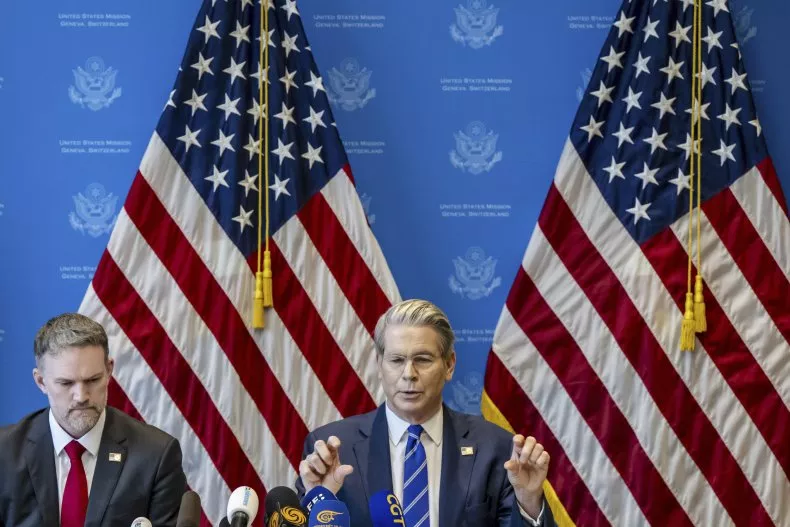First Cracks Emerge in US-China Trade Truce

By John Feng
Barely a week into a U.S.-China truce in their long-running trade war, Beijing has accused Washington of violating the temporary agreement reached in Geneva.
The Chinese Commerce Ministry said on Monday that the U.S. was taking "discriminatory measures" against China, after the U.S. Commerce Department recently warned American businesses to avoid Chinese-made microchips, specifically those produced by Chinese tech giant Huawei.
Why It Matters
Both countries have walked back a series of punitive actions against the other as part of a 90-day pause agreed at the recent talks in Switzerland after U.S. President Donald Trump had imposed heavy tariffs. A consultation mechanism was created to discuss their wide-ranging trade disagreements, but the scope of the special channel may now be under dispute.
The Chinese government's strongly worded pushback against sustained U.S. industrial policy in emerging and critical technologies—such as advanced computer chips fueling the race for AI supremacy—suggests the deep-rooted economic security concerns present in both camps will not be easily addressed despite agreements on paper.
China's embassy in Washington, D.C., and the U.S. Commerce and Treasury departments did not immediately return Newsweek's emails seeking comment after hours.
What To Know
An alert by the U.S. Commerce Department's Bureau of Industry and Security said Chinese advanced-computing integrated circuits like Huawei's powerful Ascend chips "were likely developed or produced in violation of U.S. export controls."
"BIS is warning that, pursuant to [General Prohibition 10], the use of such [People's Republic of China] advanced computing ICs risks violating U.S. export controls and may subject companies to BIS enforcement action," the guidance said, referring to transactions with knowledge that a U.S. sanctions violation has or will occur.
In a general response last week, a spokesperson for the Chinese Commerce Ministry said the U.S. had "abused its export control measures and imposed stricter restrictions on Chinese chip products under unfounded allegations."
In an updated statement released on its website this week, the ministry said the U.S. actions "seriously undermined the consensus reached at the high-level talks between China and the U.S. in Geneva."
Read more China
NATO Member's Warship Sends Message to China
US Ally Intercepts Chinese Fleet Breaching Pacific Island Chain
China Starts Building First Giant Supercomputer Network in Space
US Ally Plans Long-Range Missile Test Amid China and Russia Threats
Chinese negotiators used the special channel and "demanded that the U.S. correct its mistakes," the statement said, adding that the two sides should "resolve respective concerns" through mechanisms such as the new economic and trade consultations.
"If the U.S. insists on its own way and continues to substantially harm China's interests, China will take resolute measures to safeguard its legitimate rights and interests," the ministry said.
Huawei is a Chinese "national champion," a large enterprise in a strategic sector with strong links to the state. It has been targeted before in the U.S.-China tech war, including during Trump's first presidency.
Despite attempts to shut out China's high-tech players, chipmakers like Huawei continue to grow and have made advances that have surprised industry insiders. The AI race will be won by computing power, and the U.S. appears to be concerned about the competitiveness of Chinese tech and the impact their products may have on rival American firms that are still trying to catch up.
The complaints this week about the sweeping sanctions on Chinese tech may point to a disconnect between Beijing and Washington about what elements of the trade dispute are up for discussion. China's argument suggests nothing should be off limits, but the U.S. move indicates the chip war remains a core national security concern that could exist outside the framework of any future Sino-American trade agreement.
What People Are Saying
U.S. Bureau of Industry and Security: "BIS is notifying all persons and companies in the United States and abroad that engaging in GB10 activities...without requisite authorization from BIS could result in BIS enforcement actions which could include substantial criminal and administrative penalties, up to and including imprisonment, fines, loss of export privileges, or other restrictions."
Chinese Ministry of Commerce: "The U.S. is overreaching, a typical unilateral bullying behavior that China firmly opposes. The U.S.'s actions seriously harm the legitimate rights and interests of Chinese companies, seriously threaten the security and stability of global semiconductor production supply chains, and have a serious impact on global technological innovation."
What Happens Next
The U.S. and China are still talking behind closed doors. The U.S. and Chinese trade representatives Jamieson Greer and Li Chenggang met last week in South Korea on the margins of APEC.
There are clear signs that the Trump administration and Beijing are not on the same page—on the trade deficit, on Chinese industrial overcapacity, and on high technology—which may not bode well for U.S. capital markets still heavily invested in the Chinese economy.
Welcome to Billionaire Club Co LLC, your gateway to a brand-new social media experience! Sign up today and dive into over 10,000 fresh daily articles and videos curated just for your enjoyment. Enjoy the ad free experience, unlimited content interactions, and get that coveted blue check verification—all for just $1 a month!
Account Frozen
Your account is frozen. You can still view content but cannot interact with it.
Please go to your settings to update your account status.
Open Profile Settings